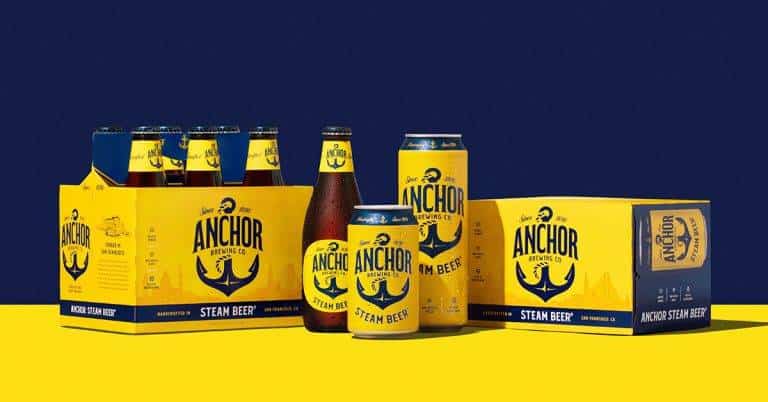Anchor Brewing Company Shuts Down: Impact On The Craft Beer Industry

Table of Contents
Anchor Brewing's Legacy and Contribution to Craft Beer
A Pioneer of American Craft Beer
Anchor Brewing played a pivotal role in popularizing craft beer in the United States. Its history is intrinsically linked to the evolution of American brewing.
- Introduction of Anchor Steam Beer: Anchor Steam Beer, introduced in 1971, became a flagship brew and a defining example of a unique California style, influencing countless other breweries.
- Influence on Brewing Styles: Anchor's commitment to traditional brewing methods and innovative techniques helped redefine what American craft beer could be, setting a high bar for quality and taste.
- Early Adoption of Specific Ingredients and Techniques: Anchor’s dedication to using high-quality ingredients and precise brewing methods established benchmarks for many other craft breweries. They championed locally sourced ingredients whenever possible, a trend now widely adopted.
These contributions cemented Anchor's place in beer history and its lasting impact on California craft beer and American brewing as a whole.
Cultural Significance and Brand Recognition
Anchor Brewing's influence extends beyond its beers; it's deeply intertwined with San Francisco culture.
- Association with San Francisco: The brewery became synonymous with San Francisco, its imagery appearing on countless postcards and in tourism materials.
- Iconic Imagery and Branding: Anchor's distinctive label and branding are instantly recognizable, reflecting a carefully cultivated brand identity that transcended mere product recognition.
- Cultural Impact on the City and State: Anchor helped establish San Francisco as a hub for craft beer culture, inspiring countless other breweries and influencing the city's overall identity.
This strong brand recognition and cultural association contributed significantly to its success for many years, a factor often overlooked when analyzing its recent closure.
Factors Contributing to Anchor's Closure
Increased Competition in the Craft Beer Market
The craft beer market experienced explosive growth in recent decades, creating immense competition for Anchor Brewing.
- The Explosion of Microbreweries: The number of microbreweries increased dramatically, leading to market saturation and a struggle for shelf space.
- Changing Consumer Preferences: Consumer tastes shifted towards bolder, more experimental beer styles like IPAs, leaving some traditional brews struggling to maintain market share.
- Impact of Larger Breweries Entering the Craft Market: Large breweries started acquiring smaller craft breweries, often altering their recipes and brand identities, which further pressured smaller, independent businesses.
This intense competition, coupled with the evolving landscape of the craft beer market, significantly impacted Anchor's ability to maintain its market position.
Economic Challenges and Supply Chain Issues
Anchor Brewing faced considerable economic headwinds in its final years.
- Rising Ingredient Costs: Increases in the cost of raw materials, such as hops and barley, squeezed profit margins.
- Distribution Challenges: Navigating the complexities of distribution, especially in a highly competitive market, presented ongoing difficulties.
- Inflation and Labor Shortages: The broader economic climate, characterized by inflation and labor shortages, further exacerbated the brewery's financial challenges.
These economic factors played a crucial role in Anchor's ultimate closure, highlighting the vulnerability of even established brands in the face of substantial economic pressure.
Changes in Consumer Preferences
Shifting consumer tastes played a significant role in Anchor's decline.
- Trends in Beer Styles: The popularity of IPAs and other intensely flavored, hoppy beers overshadowed more traditional styles like Anchor Steam Beer.
- The Popularity of IPAs and Other Newer Styles: The overwhelming popularity of IPAs, particularly among younger consumers, led to a decline in the demand for Anchor's more traditional offerings.
- Changing Consumer Demographics: A changing consumer demographic, with younger generations exhibiting different preferences than previous generations, further impacted sales.
Understanding these evolving consumer preferences is vital for any brewery seeking to thrive in the modern craft beer market.
The Impact of Anchor's Closure on the Craft Beer Industry
A Warning Sign for Smaller Breweries
Anchor's closure serves as a stark warning to other smaller, independent breweries.
- The Need for Adaptation and Innovation: Breweries must continuously adapt to changing consumer preferences and market conditions, embracing innovation and offering diverse products.
- Importance of Strong Branding and Marketing: A strong brand identity and effective marketing strategies are crucial for standing out in a crowded market.
- The Challenges of Scaling a Business: Balancing growth with maintaining quality and brand identity is a significant challenge for many craft breweries.
The lessons learned from Anchor’s closure emphasize the importance of strategic planning and adaptability for long-term survival.
Consolidation in the Beer Market
Anchor's closure may accelerate consolidation within the beer market.
- Acquisition by Larger Companies: The possibility of Anchor being acquired by a larger company highlights the trend towards consolidation in the industry.
- The Fate of Other Smaller Breweries: The closure raises concerns about the future viability of other smaller, independent breweries facing similar challenges.
- The Long-Term Implications for Market Diversity: Increased consolidation could reduce market diversity and limit consumer choice.
The impact of Anchor’s closure on the craft beer market’s future diversity remains to be seen.
Conclusion
The closure of Anchor Brewing Company represents a significant turning point for the craft beer industry. Its lasting legacy as a pioneer of American craft beer is undeniable. However, its demise serves as a cautionary tale about the challenges of sustained success in a dynamic and competitive market. Smaller breweries must prioritize adaptation, innovation, and strong branding to survive and thrive. The lessons gleaned from Anchor's experience are invaluable for all players in the craft beer market, crucial to preserving the sector's vibrancy and diversity. Understanding the impact of Anchor Brewing's shutdown is critical for the future of the craft beer industry. Learn from the past and build a resilient future for your craft brewery.

Featured Posts
-
 The Mets Rotation Debate Is Pitchers Name The Answer
Apr 29, 2025
The Mets Rotation Debate Is Pitchers Name The Answer
Apr 29, 2025 -
 Teslas Strength Tech Rally Lift Us Stocks Higher
Apr 29, 2025
Teslas Strength Tech Rally Lift Us Stocks Higher
Apr 29, 2025 -
 Nyt Report Pilots Failure To Turn Leads To Fatal Wichita Black Hawk Crash
Apr 29, 2025
Nyt Report Pilots Failure To Turn Leads To Fatal Wichita Black Hawk Crash
Apr 29, 2025 -
 Willie Nelson Drops New Album Before Turning 92
Apr 29, 2025
Willie Nelson Drops New Album Before Turning 92
Apr 29, 2025 -
 Revealed How Xs Debt Financing Restructured The Company
Apr 29, 2025
Revealed How Xs Debt Financing Restructured The Company
Apr 29, 2025
Latest Posts
-
 Will Pete Rose Get A Presidential Pardon Trumps Hof Campaign
Apr 29, 2025
Will Pete Rose Get A Presidential Pardon Trumps Hof Campaign
Apr 29, 2025 -
 Mlb Considers Petition To Reinstate Pete Rose Report
Apr 29, 2025
Mlb Considers Petition To Reinstate Pete Rose Report
Apr 29, 2025 -
 Trump To Pardon Pete Rose Urges Mlb To Induct Baseball Legend
Apr 29, 2025
Trump To Pardon Pete Rose Urges Mlb To Induct Baseball Legend
Apr 29, 2025 -
 Donald Trumps Pardon Push Pete Roses Hall Of Fame Bid
Apr 29, 2025
Donald Trumps Pardon Push Pete Roses Hall Of Fame Bid
Apr 29, 2025 -
 The Pete Rose Posthumous Pardon Examining Trumps Statement
Apr 29, 2025
The Pete Rose Posthumous Pardon Examining Trumps Statement
Apr 29, 2025
